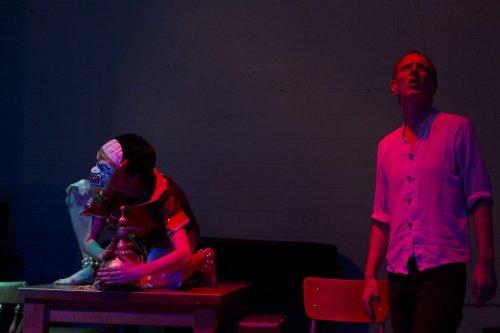Over four years in production, Terre Thaemlitz's "Soulnessless" promises to be more than a long anticipated follow-up to Thaemlitz' final electroacoustic album for Mille Plateaux, Lovebomb/愛の爆弾, which was quietly released without fanfare (or payment) at the verge of their bankruptcy in 2003. It presents a real, material response to the dilemmas of contemporary digital audio production, all the while leading listeners through a multi-media series of twists and turns that takes a minimum of days to consume, and weeks to digest.
"Soulnessless" is composed from an openly non-spiritual and anti-religious perspective that sees atheism not as a "solution" or "alternative" to religious organizing, but as an act of self-defense entwined with the hopelessnes of life amidst an unstoppable onslaught of spiritual dogmas and superstitions. It consists of five pieces that approach the central theme from a variety of vectors, their tenuous connection being unlikely collisions of gender, audio production and spirituality. Although the elements' assemblage may at first appear haphazard or random, their precarious grouping is in fact a deliberate structural metaphor for incongruous social simultaneities, and an aversion to thematic reductionism. In this manner, the structural complexity of "Soulnessless" is about diversity as ‘disconnection,’ rather than as the controllable and celebratory goal so often hypothesized in mainstream Humanist discourse. (Thaemlitz concedes the inevitability of the former, and protests the homogenizing dangers of the latter.)
In this unconventional "concert" combining lecture, slides, audio and video, Thaemlitz talks the audience through all five parts of the project, ranging from a +30 hour piano solo "Meditation on Wage Labor and the Death of the Album" critiquing the social conditions around commercial and academic music production (see separate performance description for this particular piece in Piano Solo section below), to a Feminist survey of the uses of electronic audio equipment by Roman Catholic Nuns in Philippine monasteries. This is followed by a screening of two audio/video segments, "Rosary Novena for Gender Transitioning" (20 min.) and "Traffic With the Devil" (24 min.), to be concluded with audience Q&A. (As production of the final two video segments is completed, they will also be incorporated into the event and the lecture component shortened.)
About "Rosary Novena for Gender Transitioning" (20 min.)
"Rosary..." draws parallels between spiritual deprogramming and gender deprogramming, questioning the fusion of ideology and industry behind sexual reassignment surgery (SRS), as well as expressing concern about how the essentialisms underlying SRS result in a new cult of gender identity. For Thaemlitz, who spent his teens and young adulthood actively seeking to undo the effects of having been raised in a devout Roman Catholic household, the unexpected yet irrefutable link between the seemingly disparate worlds of religion and transgenderism rests in the contents of a box from grandmother's attic.
About "Traffic With the Devil" (24 min.)
The Japanese Ministry of Justice's crackdown on Philippine immigrants who overstayed their visas unwittingly triggers a different influx of unwelcome visitors: ghosts. As the pressure of living undocumented compounds, Filipina/o overstays experience an increase in apartment hauntings and terrifying apparitions, the spirits cohabitating their homes mirroring their own ghostly presence in Japanese society at large. Developing themes around the problematics of contemporary audio production as an anthropological act, as introduced by Thaemlitz in "Anthropological Interventionism" ("Lovebomb," 2003), "Traffic with the Devil" is a digital audio/video work based on interviews with Filipina/o deportees which originally sought to investigate the tensions of living undocumented, and how the resulting fear and helplessness seeks expression through cultural legend and religion. Do the ghostly visitations provide psychological release, or additional trauma? As unexpected circumstances in the Philippines undermine the ability to conduct the expected interviews, a new series of social and anthropological power dynamics complicate the project beyond resolution.


